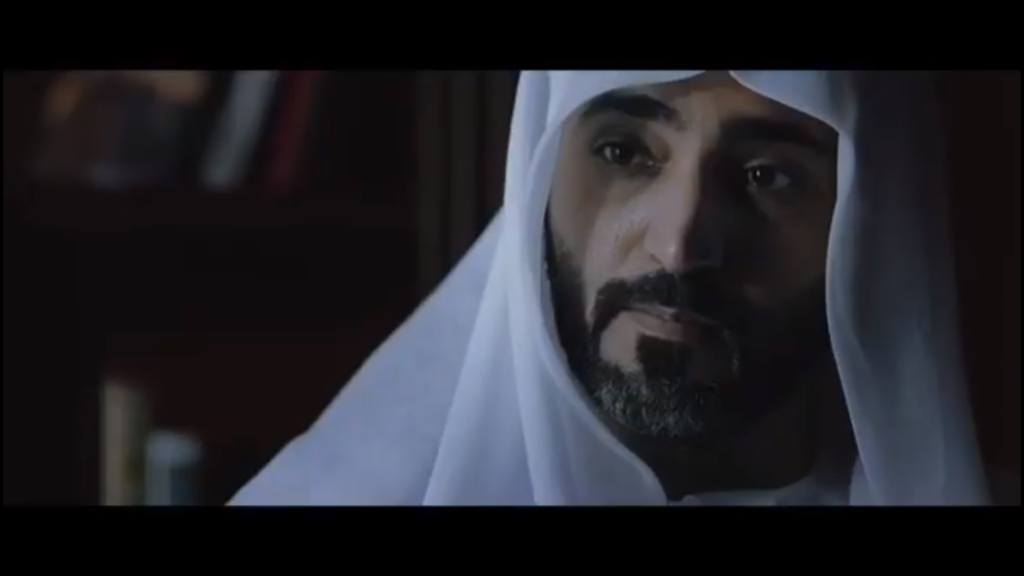Review: The Shadow (2019)

Is a motherly sin to blame for the evil possession of a young boy? Director Nayla Al Khaja, who holds the historic position of being the first female director-producer in her native United Arabic Emirates, peppers this initial question with influences from her own life. Having lived through the exorcism of a close family member, her characters are riddled with doubt, despair, and the trauma of being helpless towards a loved one. The 15-minute short serves only as a teaser for her first full-length feature film currently in development. But it epitomizes the core of the story and one of the most metaphysical plot points.
Her protagonist Maryam (Sara Al Aqeeli) presents herself as a woman in dire need of a miracle. Her son has possibly been possessed by a djin. No amount of praying and hoping has helped so far. She goes to meet Mulla Youssif (Mohannad Huthail), a Muslim scholar who specializes in such cases and in whom she sees her last chance of help. Before making any verbal commitment to the cause, the Mullah unexpectedly turns the conversation to her, asking her if any sin of her past might be the cause. The son being punished for the wrongdoings of the mother.
Al Khaja immediately toys with the establishment of the scene. The traditional white gown of the Mullah shines mysteriously against the backdrop of a dark paneled room, eclipsing its modest setup and the equally dark garment of Maryam. There is something mysterious and eerie about this man, his question piercing one painful hole after the other in Maryam’s façade until the whole thing comes crumbling down.
“Adults are the problem,” he explains his reasoning for looking for blame in her. The revenge of a djin does not always happen immediately upon the spiritual offense. “It could take months or years”, he explains. “There must be a reason.” The ensuing conversation follows amongst traditional exorcism paths. If she is a devoted Muslim. That simply reciting the Qur’an and praying doesn’t make her a such. “Not every Muslim is…a Muslim.”
So is Maryam entrapped in a Catch-22? Her superficial but driven spirituality inviting the djin into her home in the first place? Not necessarily. In this world, these supernatural beings seem to lurk in every corner regardless of the offender. And offense they take easily. Like drop boiling hot water to the ground. A rather innocent-seeming deed, that djins seem to hate with a passion.
The Mullah recounts the story of a possession he witnessed in Iraq. A young woman, Hagar (Mona Ragab), working for a rich lady, Tamara (Miran Yazi), is tasked to carry a pot of boiling water up the stairs so the menstrual pain of the lady can be eased. The home is an equally somber place, with big eyes staring down from oversized portraits, following Hagar’s every move. These otherworldly glances, on which Al Khaja focuses the camera, as well as the shadows creeping between the portraits and from the corners of the room, are the omen of things to come. A possession will take place.
Maryam, in her haste, has spilled water too. “Good that it is not hot water”, the Mullah tells her. There is clearly more to this man. And in what capacity did he witness the incident in Iraq? But it is not Al Khaja’s intention to play these truths and shocker moments out to the audience. Her approach to horror is more subtle and psychological. It’s the quiet moments, not the jump scares she takes interest in. Her tone is based on the supernatural as it is in the earthly. Is there really such a thing as possession and is Islam the answer? Or is Maryam’s boy just suffering from a neurological issue? Is the Mullah her savior? Or is he the bad guy? Like a shadow, the answer seems to move between the cracks.
The short, for being just a glimpse into a full-length picture to come, works remarkably well within its confinement. Solemnly the short scene with Maryam’s son shaking in his bed seems incomplete and missing a greater narrative arc. This is unfortunate in that regard that Al Khaja set out to channel her own experiences of watching a possessed youngster suffer into a moving picture. What these 15 minutes do provide, however, is an eerie sense of fine-tuned horror, packed with the right doses of dark tone, faith, and the supernatural.
Ubiquarian caught up with The Shadow at SLASH film festival, where it was screened in the short film competition.
Original Title: The Shadow
Country: UAE
Language: Arabic
Year: 2019
Runtime: 15 min
Written/ directed/produced: Nayla Al Khaja
Cinematographer: Mik Allen
Editor: Hanoz Navdar
Casting: Adam Alzoubi
Art Direction: Salim Al Razouk
Costume Design: Cecile Cortais
Makeup Department: Kat Allen
Music: Vladimir Persan
















